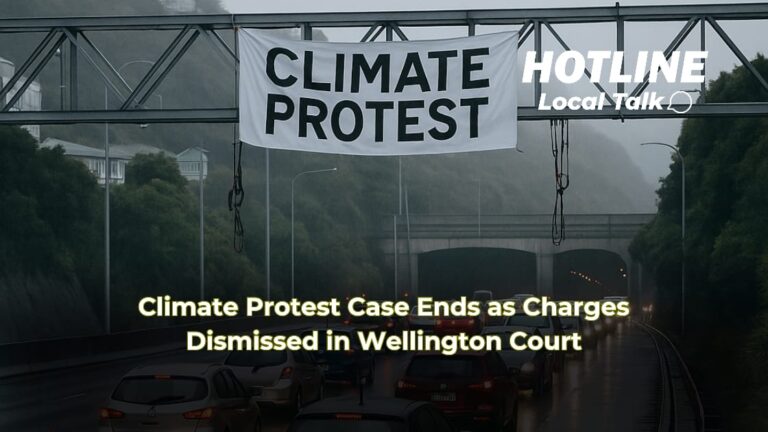In a dramatic turn of events, charges have been dropped against three climate protesters involved in a high-profile case that gripped Wellington for months. The case, which focused on climate action and civil disobedience, had drawn national attention since the first court hearing.
The four accused—Michael Apathy, Thomas Taptiklis, Te Wehi Ratana, and Andrew Sutherland—had been charged with endangering transport after a series of coordinated protests in October 2022. These protests were designed to demand the restoration of passenger rail services across New Zealand. Their method, however, sparked controversy and legal action.
During the protests, banners were suspended above Wellington’s rush-hour traffic in three locations: State Highway 1 at the entrance to the Mount Victoria Tunnel on 18 October, the motorway gantries at Bolton Street on 10 October, and Johnsonville on 27 October. The actions caused significant traffic delays, and police testified that the situation had become so dangerous that vehicles had to be halted completely.
Each protester pleaded not guilty to their respective charges. Apathy, Ratana, and Sutherland each faced one count, while Taptiklis faced two. If convicted, they could have faced up to 14 years in prison. Their defence argued that the looming threat of the climate crisis justified their actions, claiming the disruption was a necessary wake-up call.
The trial, which began on 26 February, featured intense courtroom debate. The prosecution insisted that the protesters’ actions were not only reckless but completely without public benefit. They argued that “dangling themselves like a circus act” above traffic put lives at risk and should be punished accordingly.
Yet, two expert climate scientists gave uncontested testimony during the proceedings. They spoke about the potentially devastating consequences of unchecked emissions, offering context for the urgency behind the protests. This helped frame the demonstrators’ motives in a broader public-interest narrative.
Judge Stephen Harrop, who presided over the trial, instructed the jury to put aside personal views on climate change. He reminded them that while free speech is protected in New Zealand, it does not shield individuals from legal consequences if their actions break the law. The key question, he explained, was whether the protests were reasonable in their risk and intention.
Deliberations began with intensity. The jury sought clarification from the judge on two separate issues and even asked to review footage from one of the protests that had circulated on social media. Despite their efforts, the jury reached a clear verdict on only one defendant. On 10 March, Andrew Sutherland was found not guilty. But for Apathy, Taptiklis, and Ratana, the jurors could not agree. The result was a hung jury, which was dismissed the next day.
With a retrial looming, the case remained in limbo—until this week. On Tuesday, in a move that surprised many, the Crown decided not to pursue the charges further. Judge Jan Kelly, however, agreed with the defence’s submission and dismissed the charges entirely, bringing the lengthy legal saga to an abrupt end.
Supporters of the protesters expressed relief, with many calling the outcome a victory for climate justice. The defence team reiterated that their clients had acted out of deep concern for the environment and had not intended to cause harm. They emphasised that peaceful protest remains a critical part of democratic expression.
Despite the case’s conclusion, it has sparked ongoing discussion about the limits of protest, especially in the face of global challenges like climate change. The public remains divided, with some seeing the protests as heroic, while others view them as reckless.
This case has become a reference point in debates over civil disobedience in New Zealand. As the country continues to confront the realities of climate change, it is likely that such protests—and the legal and social questions they raise—will not disappear anytime soon.
What’s clear, though, is that this particular chapter has now closed, leaving behind complex questions and a message that won’t easily fade.
TRUTH SEEKER
Instantly run a Quiz with friends... about the article. Interact more & analise the story. Dig in, catch out biased opinions, and "fact check" with TRUTH SEEKER by ONENETWORK WELLINGTONLIVE 👋
Do you agree with the main argument of this article?
Total votes: 4
What were the protesters demanding during their coordinated protests in October 2022?
Bias Analysis
Fact Check Summary
True
Source: Article
True
Source: Article








